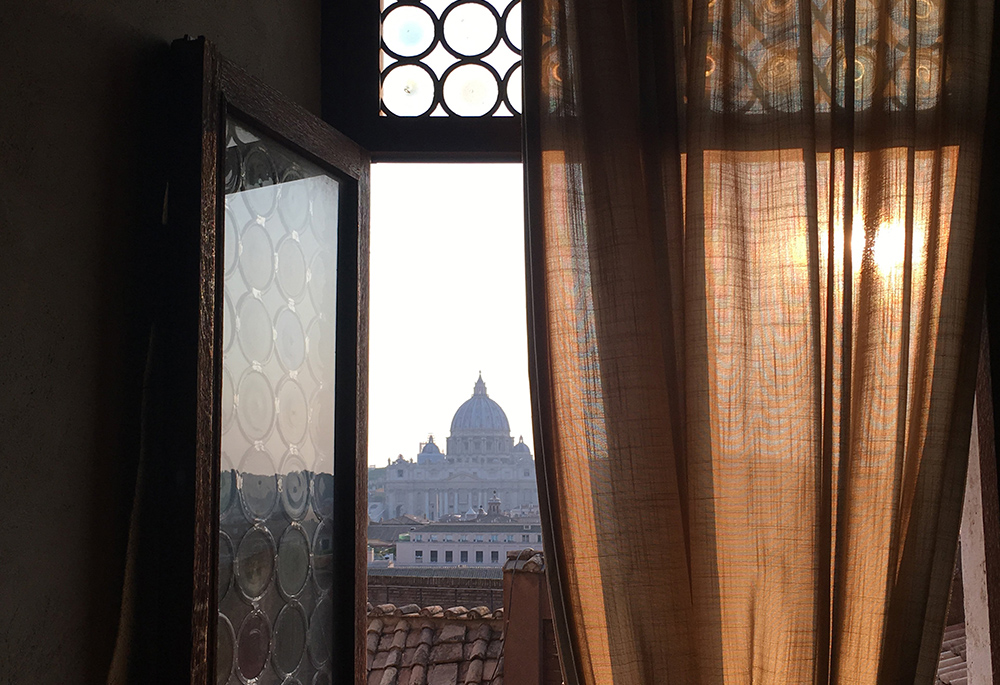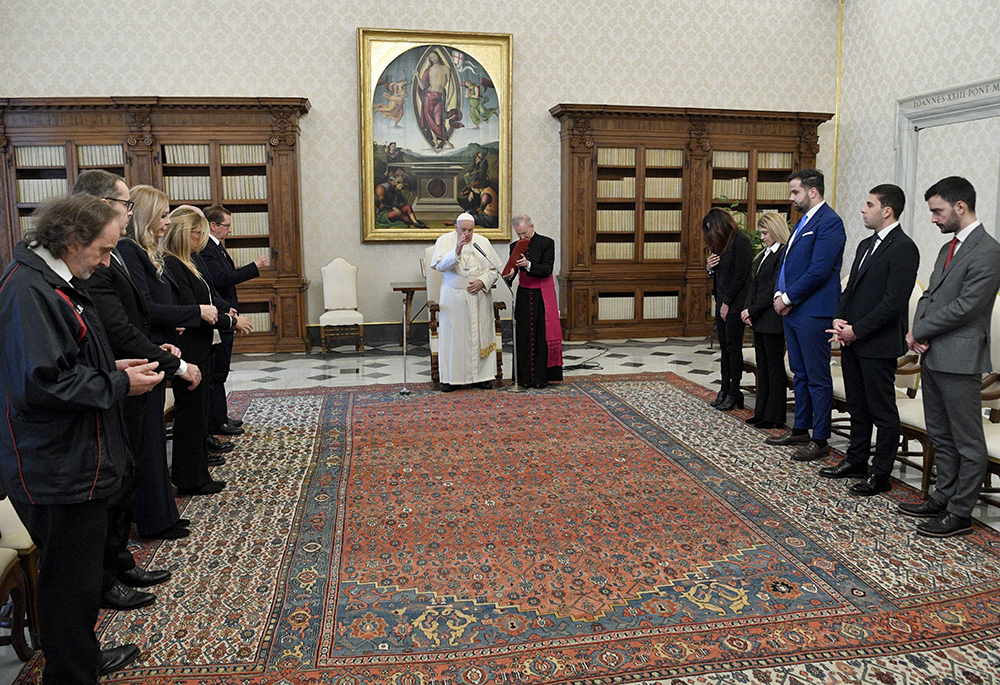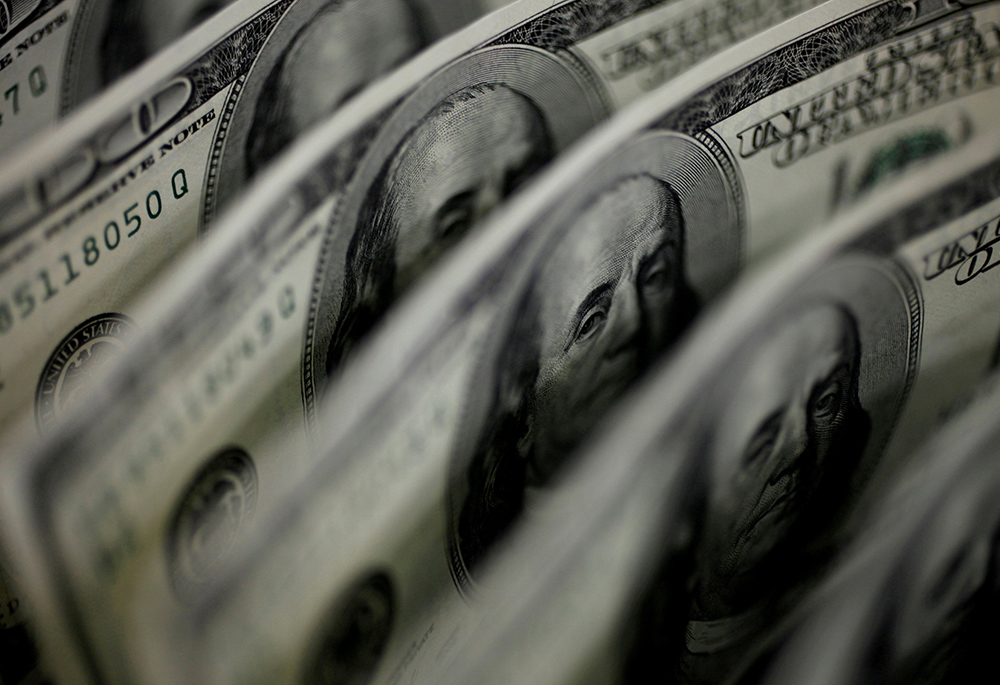
St. Peter's Basilica at the Vatican is pictured from a terrace in Rome in this 2018 file photo. Vatican News reported Jan. 24 that a new procedure "will facilitate the dissemination of knowledge and the possibility of 'whistleblowing,' or raising concerns about potential abuses, in force in the legislation of the Holy See and Vatican City State." (CNS/Paul Haring)
Calling all whistleblowers. The Vatican wants to hear from you! This comes from the Vatican's recent push to bring whistleblowers into the holy fold to help the church clean house. It is a big move for an institution historically averse to dealing so openly with misbehavior within its ranks. But there are limits to how far the church seems willing to go with its warm whistleblower embrace.
Most recently is the whistleblower procedure the Vatican implemented on Feb. 1, which provides formal guidelines for the Vatican's official enlistment of church insiders to help uncover fraud and corruption. According to Vatican News, the new procedure "will facilitate the dissemination of knowledge and the possibility of 'whistleblowing,' or raising concerns about potential abuses, in force in the legislation of the Holy See and Vatican City State. This is one of the most effective tools for combating corruption."
This call for financial whistleblowers appears to be part of Pope Francis' drive for financial transparency and integrity with the help of the Office of the Auditor General that he established in 2014. But it's not just corruption the pope is going after. He also has his sights set on tackling the sexual transgressions that have plagued the church for years.

Pope Francis gives his blessing to members of the staff of the Vatican Auditor General's Office at the end of a meeting in the library of the Apostolic Palace Dec. 11, 2023. (CNS/Vatican Media)
Again, hopefully with a helping hand from whistleblowers. The Vatican solidified the new church law Vos Estis Lux Mundi ("You Are the Light of the World"), the pope's signature anti-abuse policy, last spring after a nearly four-year trial run to smooth out the edges. These two programs together represent a brave new world for the normally insular Holy See, recognizing that a more all-hands-on-deck approach may be the best way for the church to police its own.
In taking this path, the Vatican has hopped on the ever-growing bandwagon of those that appreciate the critical role whistleblowers can play in ferreting out bad behavior from the inside out. More and more organizations are seeing this light, creating clear and safe channels for whistleblowers, recognizing it provides an early-warning system of sorts to avoid a whole lot of trouble down the road.
Advertisement
The government has been even more aggressive on the whistleblower front, rolling out numerous programs to encourage and support whistleblowers in virtually every area of government enforcement. Some of them even offer financial rewards. The False Claims Act is the most prominent example, allowing whistleblowers to sue fraudsters on behalf of the government and take a hefty slice of any recovery (up to 30%).
The Securities and Exchange Commission and Commodity Futures Trading Commission, through the Dodd-Frank Act, offer successful whistleblowers similarly lucrative payouts. So do numerous other programs the government has adopted, with more to come for sure. In all this, whistleblowers have proven invaluable in exposing wrongdoing that might otherwise have remained in the shadows.

U.S. dollars are seen in this illustration photo. (OSV News/Reuters/Yuriko Nakao)
With one important caveat. Unless they are properly protected and encouraged, most whistleblowers will not be up for the task. And for good reason. Whistleblowers remain the subject of serious scorn and are routinely retaliated against for stepping up and speaking truth to power. And that is where the Vatican may be falling short with its whistleblower foray.
First, there are no provisions for whistleblower anonymity, which will scare off many would-be whistleblowers regardless of how tight the confidentiality protections may be. While allowing anonymous reporting can complicate getting to the truth of a matter, it is critical to many of the most vulnerable and at-risk of retribution, often the ones with the most information to share.
Whistleblowers remain the subject of serious scorn and are routinely retaliated against for stepping up and speaking truth to power. And that is where the Vatican may be falling short with its whistleblower foray.
Second, there is an overly confined and complicated scope of who and what the programs cover. There should be no restrictions as to who can report misconduct — church insiders or outsiders alike. And there should be no constraints on what wrongdoing is covered.
Third, there are no provisions for independent oversight and investigation. The programs essentially involve the church policing its own, which has not gone so well in the past and is what prompted the pope to launch these programs in the first place. An independent Office of the Auditor General may help depending on how truly independent it is from the church hierarchy. But there does not appear to be any kind of autonomous investigating body contemplated for the anti-abuse program. Independent oversight is critical. As is some alternative vehicle whistleblowers can pursue to some higher or outside authority if they do not get the proper attention the Vatican is promising.
No doubt, there is much to applaud with the Vatican's clarion call for whistleblowers, which checks so many of the boxes necessary to give whistleblowers the guidance and confidence to step forward — definitive reporting procedures, dedicated reporting channels, protections against retaliation, strict confidentiality, and strong backing from the very top of the organization. But unless these pitfalls are in some way plugged, there is a serious risk they will undermine the ultimate success of the Vatican's noble quest.




